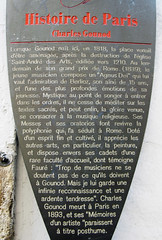

Charles Gounod
(1818-1893)
Died aged c. 75
Wikidata WikipediaCharles-François Gounod (/ɡuːˈnoʊ/; French: [ʃaʁl fʁɑ̃swa ɡuno]; 17 June 1818 – 18 October 1893), usually known as Charles Gounod, was a French composer. He wrote twelve operas, of which the most popular has always been Faust (1859); his Roméo et Juliette (1867) also remains in the international repertory. He composed a large amount of church music, many songs, and popular short pieces including his Ave Maria (an elaboration of a Bach piece), and Funeral March of a Marionette. Born in Paris into an artistic and musical family Gounod was a student at the Conservatoire de Paris and won France's most prestigious musical prize, the Prix de Rome. His studies took him to Italy, Austria and then Prussia, where he met Felix Mendelssohn, whose advocacy of the music of Bach was an early influence on him. He was deeply religious, and after his return to Paris, he briefly considered becoming a priest. He composed prolifically, writing church music, songs, orchestral music and operas. Gounod's career was disrupted by the Franco-Prussian War. He moved to England with his family for refuge from the Prussian advance on Paris in 1870. After peace was restored in 1871 his family returned to Paris but he remained in London, living in the house of an amateur singer, Georgina Weldon, who became the controlling figure in his life. After nearly three years he broke away from her and returned to his family in France. His absence, and the appearance of younger French composers, meant that he was no longer at the forefront of French musical life; although he remained a respected figure he was regarded as old-fashioned during his later years, and operatic success eluded him. He died at his house in Saint-Cloud, near Paris at the age of 75. Few of Gounod's works remain in the regular international repertoire, but his influence on later French composers was considerable. In his music there is a strand of romantic sentiment that is continued in the operas of Jules Massenet and others; there is also a strand of classical restraint and elegance that influenced Gabriel Fauré. Claude Debussy wrote that Gounod represented the essential French sensibility of his time.
DbPedia
Commemorated on 2 plaques
Charles Gounod 1818-1893 Composer stayed here in 1870
17 Morden Road, Blackheath, SE3, London, United Kingdom where they stayed
Charles Gounod. Lorsque Gounod naît ici, en 1818, la place venait d'être aménagée, après la destruction de l'église Saint-André des Arts, édifiée vers 1210. Au lendemain de son grand prix de Rome (1839), le jeune musicien compose un "Agnus Dei" qui lui vaut l'admiration de Berlioz, son aîné de 15 ans, et l'une des plus profondes émotions de sa jeunesse. Mystique au point de songer à entrer dans les ordres, il ne cesse de méditer sur les textes sacrés, et peut enfin, la gloire venue, se consacre à la musique religieuse. Ses Messes et ses oratorios font revivre la polyphonie qui l'a séduit à Rome. Doté d'un esprit fin et cultivé, il apprécie les autres arts, en particulier la peinture, et dispose envers ses cadets d'une rare faculté d'accueil, dont témoigne Fauré: "Trop de musiciens ne se doutent pas de ce qu'ils doivent à Gounod. Mais je lui garde une infinie reconnaissance et une ardente tendresse". Charles Gounod meurt à Paris en 1893, et ses "Mémoires d'un artiste" paraissent à titre posthume.
English translation: Charles Gounod. When Gounod was born here in 1818, the square had just been built, after the destruction of the church of Saint-André des Arts, built around 1210. After his grand prize in Rome (1839), the young musician composed an “Agnus Dei” which earned him the admiration of Berlioz, his 15-year-old, and one of the deepest emotions of his youth. Mystic to the point of contemplating entering orders, he constantly meditates on sacred texts, and can finally, the glory coming, dedicates himself to religious music. His Messes and oratorios revive the polyphony that seduced him in Rome. With a fine and cultivated spirit, he appreciates the other arts, especially painting, and has a rare welcome faculty for his cadets, as Fauré testifies: “Too many musicians do not know what they owe to Gounod. But I keep him an infinite gratitude and an ardent tenderness.” Charles Gounod died in Paris in 1893, and his “Memoirs of an Artist” appeared posthumously. [AWS Translate]
1 rue Suger, Paris, France where they was born (1818)

